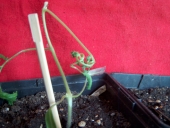posted 7 years ago
This is my first time growing tomatoes from seed, but I'm running into a problem with stunted growth and have no idea what the cause is. I purchased a fancy starting mix with coconut coir, worm castings, azomite, humus, and some fungi, which was a dry mix which expands as you add water. It was a great mix as it held water well. The seeds sprouted fabulously, only the wild cherries were a little slow and feeble. Our garden wasn't ready to be planted as soon as we hoped, however, so the seedlings had to stay in their trays for about a month and a half. They grew true leaves and got about 6 inches tall, but never got any taller. I transplanted them into the garden in their little biodegradable seedling cups right into the soil, and piled up some of the seedling mix around them for better water retention and nutrition. It's been 2-3 weeks, but they haven't grown any new leaves and haven't increased in size. Granted, our nights have been a bit cool, this Spring is definitely the coolest I've ever experienced in Texas, so I blame it on that, but I'm just about to start over and plant tomatoes again from seed right into the garden. The same thing is happening to many other seedlings, like basil, melissa, and malabar spinach. When I transplanted the seedlings, I also planted some seeds directly into the garden, like lettuce, sunflower, beans, zucchinis, etc., and they are doing great.
Maybe I kept them too long in the seedling cups? Maybe they're just expanding their roots right now? Should I wait longer? Should I amend with something? I have not done any soil testing, but this is a new garden with a purchased soil with balanced nutrition mixed in with native soil, and all the other plants grown from seed are doing fine.







